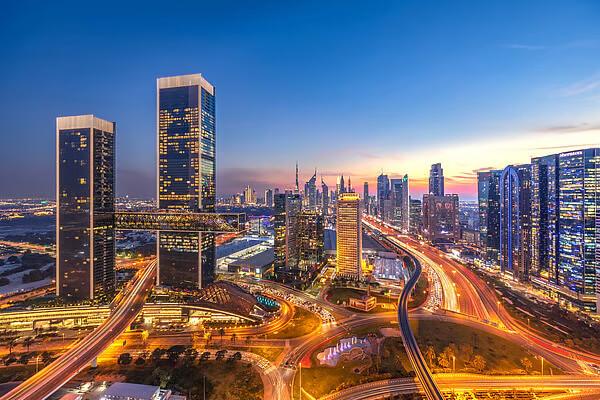Off-plan offices in Dubai became the city’s newest source of investment, changing the demand for corporate real estate and ushering in one of its most exciting periods in ten years.
According to Engel & Völkers Middle East, commercial transactions reached Dh12.3 billion across 1,274 deals in October, up 21.4% year over year. In comparison to the same month in 2024, the value of activity increased by 9.9%, indicating one of the best monthly results ever.
The office sector is the most notable contributor, with a 64% increase in transaction volumes and a 98% increase in values. Dubai’s near-record prime office occupancy rates, which are typically around 90%, and structural changes in corporate behavior as multinational corporations concentrate regional operations in the emirate are contributing factors to the momentum. Grade A neighborhoods like Business Bay and Jumeirah Lakes Towers are still in great demand, and investors are drawn to the rapidly expanding off-plan market due to the limited supply.
This change is significant. Off-plan office sales increased by 464%, from 69 deals in Q3 2024 to 389 in Q3 2025. 225 off-plan office deals were finalized in October alone, up from just 33 in the same month last year. At the heart of this wave are developments like Lumena, Lumena Alta, AHS Tower, Samana Barari Avenue, 31 Above, and Aspirz Tower, which draw investors looking for cutting-edge, productive offices based on wellness amenities, high-end digital infrastructure, and sustainability requirements.
“The off-plan office segment has become one of Dubai’s most dynamic investment stories this year,” said Alex Lourenço, head of Commercial at Engel & Völkers Middle East. “Grade A supply is extremely tight, and corporates are demanding buildings that meet global benchmarks for design, technology and energy performance. Investors have responded to that gap with confidence, and pre-sales are reflecting this shift.”
The tendency is being strengthened by Dubai’s overall economic circumstances. Global corporations are increasingly choosing the UAE as their regional base, and new business registrations hit all-time highs in 2025. The number of active businesses in the financial center has increased by more than half over the last three years, according to figures from the Dubai International Financial Center. In the meantime, CBRE and JLL have both seen significant upward pressure on prime office rents due to persistent inflows of professional talent and growing global demand.
Retail properties are still doing well. Due to population growth, tourism expenditure, and the ongoing growth of foreign brands, sales volumes increased by 29% in October and transaction values doubled year over year. As foot traffic expectations rise, developers are increasingly adding retail space to mixed-use business and residential complexes.
In light of this, the residential sector is beginning a more stable growth cycle following two years of remarkable acceleration. Off-plan activity accounted for 68.3% of the 18,530 residential sales in October. Month over month, secondary sales increased by 14.4%, indicating a resurgence of demand in ready-to-move-in properties. With an average rental yield of 6.8%, apartments accounted for 85.8% of transactions. Prices continue to rise steadily, increasing by 5 to 10% in many apartment complexes and 10 to 20% in villa neighborhoods.
Beyond property-specific dynamics, macroeconomic trends are deepening Dubai’s appeal as a headquarters destination. Standard Chartered’s “Future of Trade: Resilience” report identifies the UAE as one of six global markets shaping the future of international trade. Twenty per cent of corporates worldwide are reassessing their supply chains through the UAE, signalling its growing role as a resilient logistics and commercial hub with strong connectivity to Mainland China, Asean, Africa and the United States.
Half of corporates surveyed in Saudi Arabia, Egypt and India intend to expand trade with the UAE. “The UAE’s rise as a global trade hub reflects the country’s vision to diversify its economy and invest in world-class infrastructure,” said an analyst at a leading bank. “It is increasingly positioned at the centre of tomorrow’s trade corridors.”
Diversification is still supported by government-led industrial initiatives including Operation 300bn, which aims to increase the industrial sector’s contribution to Dh300 billion by 2031. Future-ready commercial spaces are becoming more and more in demand as a result of investments in data centers, cloud infrastructure, sophisticated logistics, and renewable energy.
Engel & Völkers predicts that Dubai’s commercial real estate market will continue to grow until 2026 due to the scarcity of premium office supplies, high investor demand, and growing international demand. A new growth cycle has begun, gradually transforming Dubai’s commercial real estate market from a steady performer to a strategic driver of the UAE’s evolving global trade and business environment, marked by a surge in off-plan offices.
